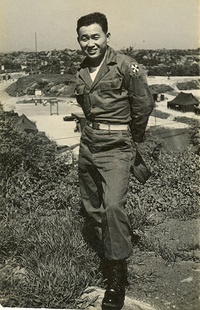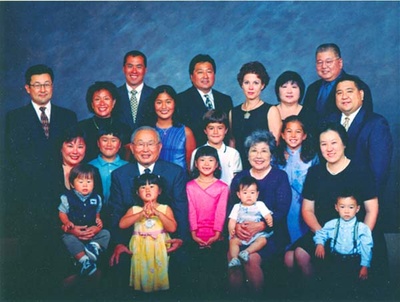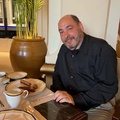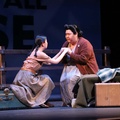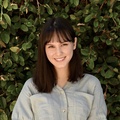Read Part 1 >>
Only a few days after Henry and Helen’s wedding ceremony, Henry left for Korea where he was stationed for eight months before transfer back to headquarters in Tokyo. Helen joined him there. “The first chance we had,” said Henry, “I took her to Yamaguchi where my parents were still living and introduced her.” Helen drolly remarked, “you know how Japanese mothers size up their son’s wives.” “She took her through the whole village, introducing her,” replied Henry. “She had no other choice!” laughed Helen.
Henry worked in Tokyo for ten years as a Federal Procurement and Contracting Officer negotiating multi-million dollar contracts with Japanese companies in support of US Military Operations in the Far East. That’s where four of their five children were born. In addition to getting to know Henry’s parents during their years in Japan, Helen was able to connect with relatives she never knew. Her parents had never discussed who they left behind or why they came to America. “In our generation, you never questioned the parents,” said Helen. “You just obeyed. I wish I’d asked them what made them come. My father was not the eldest son so maybe his prospects didn’t look too good. In Japan, it’s the eldest son who inherits everything.”
It’s also the eldest son, the chonan, who inherits the family responsibilities. Henry had successfully arranged for his kibei siblings return to America. He also advocated for the passage of private legislation which granted his parents and grandmother permanent resident status in the U.S. Henry regards the resettling of his family back in the States as his proudest accomplishment. He had worked hard to achieve professional success in Tokyo, but his father reminded him that “life’s ultimate happiness is attained only when the entire family prospers.” He urged Henry to return to California, assume the role of chonan, and build a family business. Starting over once again, Henry began a new career in the grocery business with his three brothers and father. Expanding from their initial location into a small chain of supermarkets, the family worked long hours, seven days a week to thrive against fierce competition. Henry kept up this demanding schedule for twenty-six years until he was almost sixty.
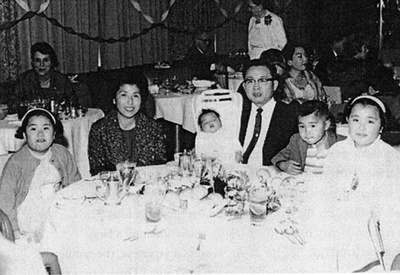
The Yasuda family returning to the United States from Japan in 1964 aboard the American President Lines cruise ship.
In the Japanese culture, a man’s sixtieth birthday is a significant milestone. Kanreki marks the completion of five cycles of the Chinese calendar, representing a full life. If one lives beyond that, he is considered reborn. About this time, his grandmother told him, shortly before she passed away, that “your accomplishments, big and small, have been made possible by other people, okage sama de.” Her dying words guided his life after “rebirth.”
Henry retired in 1988, his kanreki year, and has since devoted his “new” life to giving back to the community. He began by volunteering at the Higashi Honganji Buddhist Temple. He also volunteered for Yamaguchi Kenjinkai, the organization of his parents’ birthplace prefecture. “Then, one day, the Museum people approached me,” said Henry. “They said ‘we’re going to build the Japanese American National Museum. Its mission is to promote goodwill between not only between various people in the community but also with Japan, foster understanding.’ ” Henry and Helen began their training with the first group of Museum docents.
As Henry tells it, “Nancy Araki approached me and said, ‘Henry, when we open up the Pavilion, we’re going to have a lot of visitors from Japan. I want you to organize a Japanese speaking tour. Why don’t you establish a committee, train, and be ready?’ So I said okay. A few of us got together and hammered out basic policies. Eventually, the Pavilion opened up and we started to get all kinds of people from Japan. In fact I vividly remember the Prime Minister of Japan, Toshiki Kaifu. The Emperor came. I escorted the Princess Sayoko and also, Prime Minister Obuchi. I had the honor to escort both of them throughout the museum.”
Despite Henry’s fluency in English and Japanese, having royal visitors still gave him pause. “You don’t speak to the them like you do common people, so I had to contact the Consul General’s office and ask how to address the princess. You don’t say ‘you.’ In this country, ‘you’ is ‘you.’ In Japan, depending on who you’re addressing, it could change from ‘anata,’ ‘akemi,’ and so forth. They told me to rephrase the way to address her. Don’t say ‘you!’ It’s ‘your highness.’ As it turned out, the Princess, only said, ‘hai, hai, hai.’ I did all the talking. It was very fun.” Henry was selected for the Outstanding Program award in 1999.
While Henry specializes in giving tours to visitors from Japan, Helen takes on a variety of volunteer roles at the Museum. “I think I’ve actually been on almost all the committees in one form or another. Basically my role is that of a docent for student groups,” said Helen. Docents lead tours of Museum exhibitions, sometimes including storytelling, taiko, origami, and other activities. She also helps with Community Outreach events where she represents the Museum at obons and Asian Heritage Month celebrations and talking to local organizations and groups of all ages. She also assists with membership drives. JANM selected Helen for the Outstanding Program Award in 2000 and the Tanimura Outstanding Volunteer Award in 2010. Helen and Henry recently joined the Museum’s Legacy Society.
The Yasuda’s commitment to the Museum reinforces the values they live by and pass on. They’ve been outstanding role models to their children. Helen even found time to return to Cal State Los Angeles once her youngest child was in high school to finish her degree, reinforcing the value of education. Now, their five grown children are all successful professionals with advanced degrees and growing families of their own. “When the time comes,” said Helen, “I’m sure that they will volunteer at the museum. You’ve got to raise your family first, just like we did.”
Henry shared the message he always tries to convey to Museum visitors from Japan. “I tell them what the Japanese people have done outside Japan. Why were were they successful? Because they adhered to the basic value of ganbare—do your best, neh? And persevere, and get the best education you can and then succeed and then give back to the community. So these are the values that I tell the Japanese people about—the basis for why the Nikkei are so successful. It’s because we, our parents, our ancestors have brought these basic values and they have passed them on to us. Okagesama-de, appreciation. This is why we’re successful. When I live in this diversified community, I’m so proud to be a Japanese descendant.” The Japanese Spirit, Yamato Damashi, thrives thanks to Henry and Helen Yasuda.
© 2011 Japanese American National Museum


